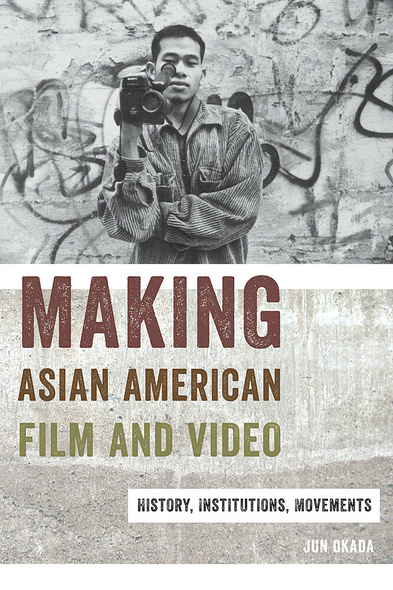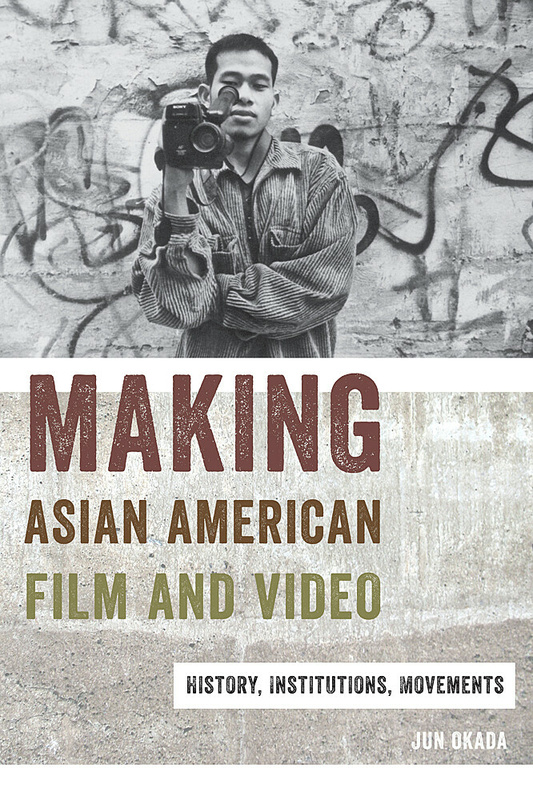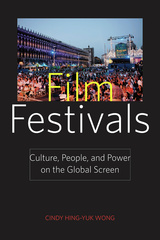
180 pages, 6 x 9
12 photographs
Paperback
Release Date:06 Mar 2015
ISBN:9780813565019
Hardcover
Release Date:06 Mar 2015
ISBN:9780813565026
Making Asian American Film and Video
History, Institutions, Movements
By Jun Okada
SERIES:
Asian American Studies Today
Rutgers University Press
The words “Asian American film” might evoke a painfully earnest, low-budget documentary or family drama, destined to be seen only in small film festivals or on PBS (Public Broadcasting Service). In her groundbreaking study of the past fifty years of Asian American film and video, Jun Okada demonstrates that although this stereotype is not entirely unfounded, a remarkably diverse range of Asian American filmmaking has emerged. Yet Okada also reveals how the legacy of institutional funding and the “PBS style” unites these filmmakers, whether they are working within that system or setting themselves in opposition to its conventions.
Making Asian American Film and Video explores how the genre has served as a flashpoint for debates about what constitutes Asian American identity. Tracing a history of how Asian American film was initially conceived as a form of public-interest media, part of a broader effort to give voice to underrepresented American minorities, Okada shows why this seemingly well-intentioned project inspired deeply ambivalent responses. In addition, she considers a number of Asian American filmmakers who have opted out of producing state-funded films, from Wayne Wang to Gregg Araki to Justin Lin.
Okada gives us a unique behind-the-scenes look at the various institutions that have bankrolled and distributed Asian American films, revealing the dynamic interplay between commercial and state-run media. More than just a history of Asian Americans in film, Making Asian American Film and Video is an insightful meditation on both the achievements and the limitations of institutionalized multiculturalism.
Making Asian American Film and Video tells the fascinating and significant story of the emergence of Asian American film and video within the wider media culture of the United States.
A first-of-its-kind study of Asian American cinema's productive and sometimes uncomfortable relationship to institutional definitions of 'Asian America.'
Okada has written a very important book. The historical reach, the diversity of texts, and the expansive engagement with filmic influences make it possible for her to take an inventory of Asian American film and video in the second decade of the twenty-first century and wonder what might be possible for the future of Asian American film and video.
Both a hip guide to movies for your queue and an incisive commentary on the ways we (filmgoers, critics, TV executives, and others) use movies and TV to talk about race, sex, and class. Okada makes Asian American film fun again.
Institutional context provides Okada with the framework for her illuminating study of Asian American filmmaking from its roots in the early 1970s to the present.
A first-of-its-kind study of Asian American cinema's productive and sometimes uncomfortable relationship to institutional definitions of 'Asian America.'
Making Asian American Film and Video tells the fascinating and significant story of the emergence of Asian American film and video within the wider media culture of the United States.
Okada has written a very important book. The historical reach, the diversity of texts, and the expansive engagement with filmic influences make it possible for her to take an inventory of Asian American film and video in the second decade of the twenty-first century and wonder what might be possible for the future of Asian American film and video.
Both a hip guide to movies for your queue and an incisive commentary on the ways we (filmgoers, critics, TV executives, and others) use movies and TV to talk about race, sex, and class. Okada makes Asian American film fun again.
Institutional context provides Okada with the framework for her illuminating study of Asian American filmmaking from its roots in the early 1970s to the present.
JUN OKADA is an assistant professor of English and director of film studies at the State University of New York, Geneseo.
Acknowledgments
Introduction: The Shared History of Asian American Film and Video and Public Interest Media
Chapter 1: “Noble and Uplifting and Boring as Hell”: Asian American Film and Video, 1971–1982
Chapter 2: The Center for Asian American Media and the Televisual Public Sphere
Chapter 3: Pathology as Authenticity: ITVS, Terminal USA, and the Televisual Struggle Over Positive/Negative Images
Chapter 4: Dismembered from History: The Counternostalgia of Gregg Araki
Chapter 5: Better Luck Tomorrow and the Transnational Reframing of Asian American Film and Video
Chapter 6: Post–Asian American Feature Film: The Persistence of Institutionality in Finishing the Game: The Search for a New Bruce Lee and American Zombie
Afterword
Notes
Bibliography
Index









